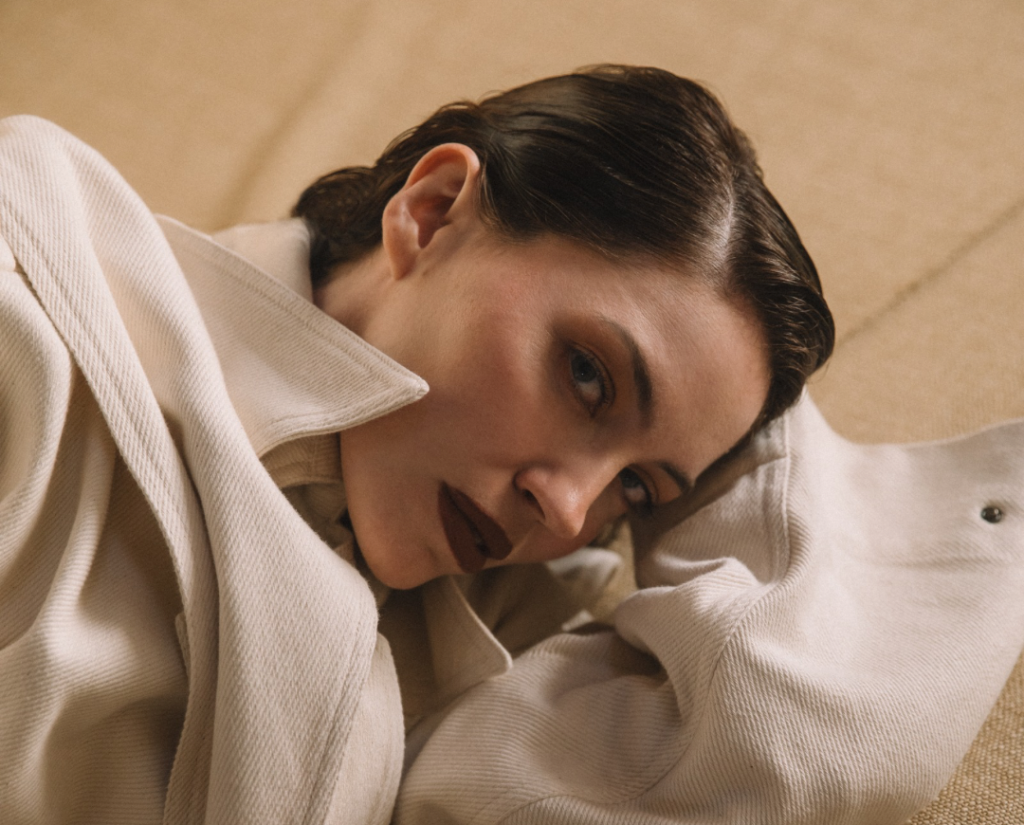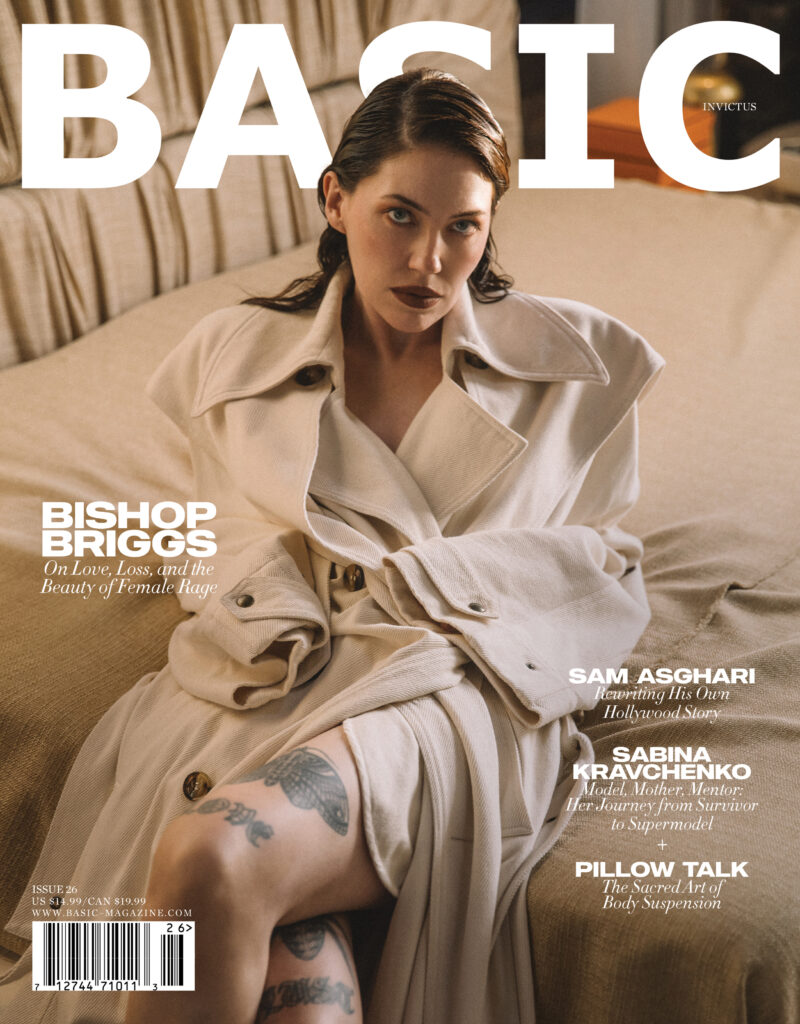
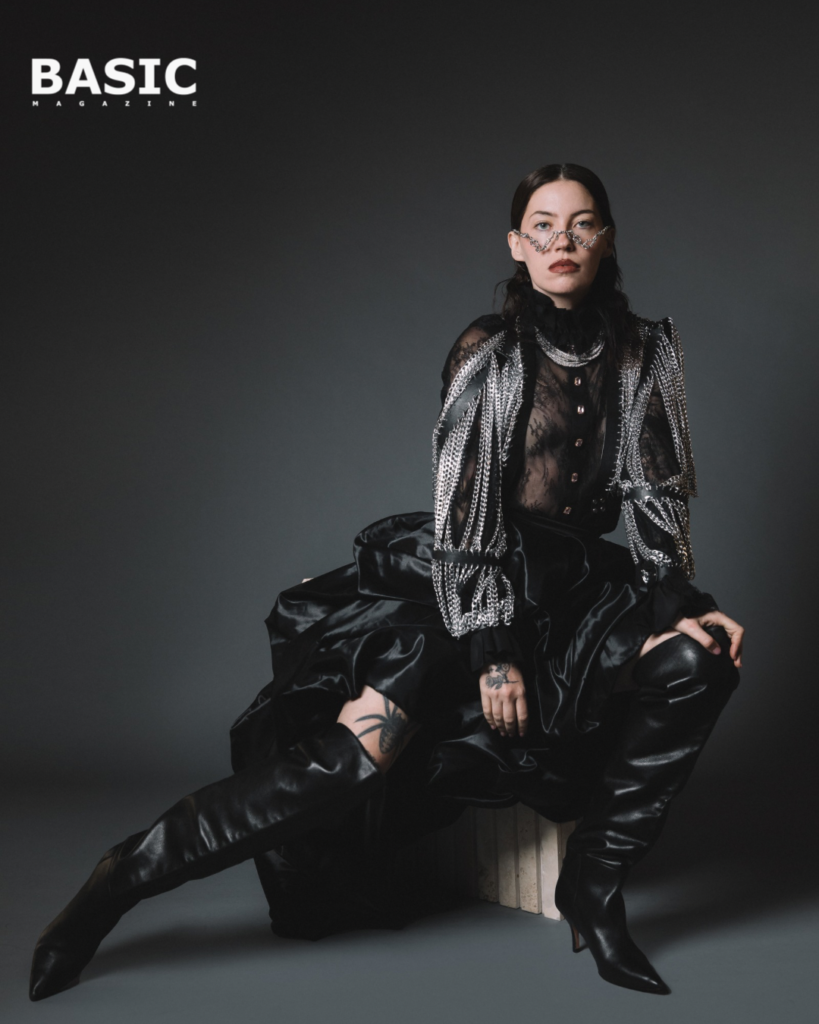
Chain Blazer ARDA DESIGN SHOP @arda.designshop
Black Skirt GISELLE MATAMALA @gisellematamala
Necklace ROCKNOT @shoprocknot
Eyewear BURKINABAE @burkinabae
Boots FLOR DE MARIA @flordemariacollection
Photographer DYLAN PERLOT @dylanperlot
Stylist MICHELLE WU @michellewustyle
Hair and Makeup NATALIE CASTILLO @nataliecastillomua
Production Coordinator CASSIDY COCKE @cassidy.ac
Intern MADELEINE POEL @madeleine.m.p
Location ZEVARRA LOFTS @zevarralofts
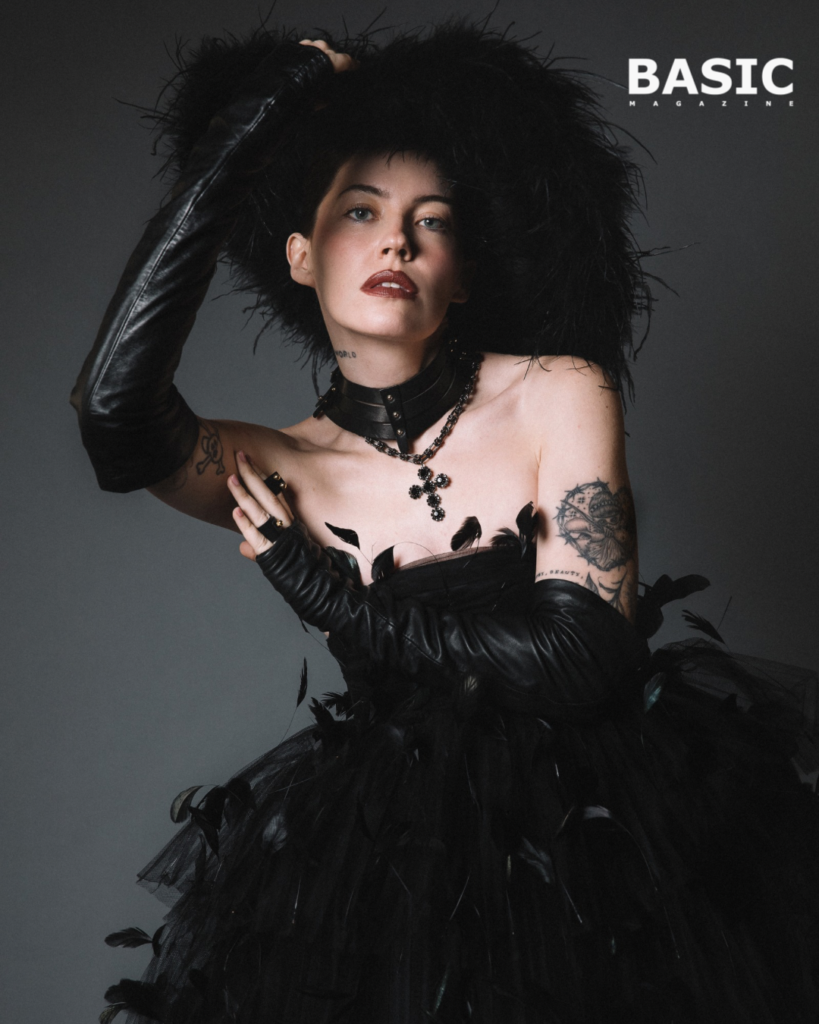
Gown CHARAH @charah.studio
Gloves UNCUFFED LEATHER @uncuffedleather
Rings, Choker LIBRA BY EMILIA SIANO @emiliasiano_jewelry
Necklace TOVA @tovastore
Words by Kimberly Haddad
I will never forget the moment I discovered Bishop Briggs. Her sensational song “River,” which has garnered close to two billion streams worldwide, took me by surprise on my Spotify Discover Weekly playlist and completely blew me away. Briggs’ vocals are raspy, soulful, and deeply emotive, beautifully transitioning from fragility to strength. The song, which explores the theme of emotional isolation in a relationship, resonated with me as I was going through a similar situation when I first heard it. And true to my Libra nature, I couldn’t help but listen to it on repeat for weeks on end.
Briggs uncovered her love for singing and developed her own voice while performing karaoke in Tokyo and Hong Kong. Inspired by the passion she saw in her father’s eyes as he sang Frank Sinatra on stage, she was determined to capture that same magic. With chart-topping hits like “Dream,” “Wild Horses,” and “Champion,” Briggs has undeniably embraced that same brilliance and earned her place in the music industry. Her debut album Church of Scars and sophomore album Champion have both received high praise from critics. Most recently, Briggs released a deluxe version of her album Tell My Therapist I’m Fine, featuring the empowering anthem “Woman Is King” that celebrates the many facets of womanhood just in time for Women’s History Month.
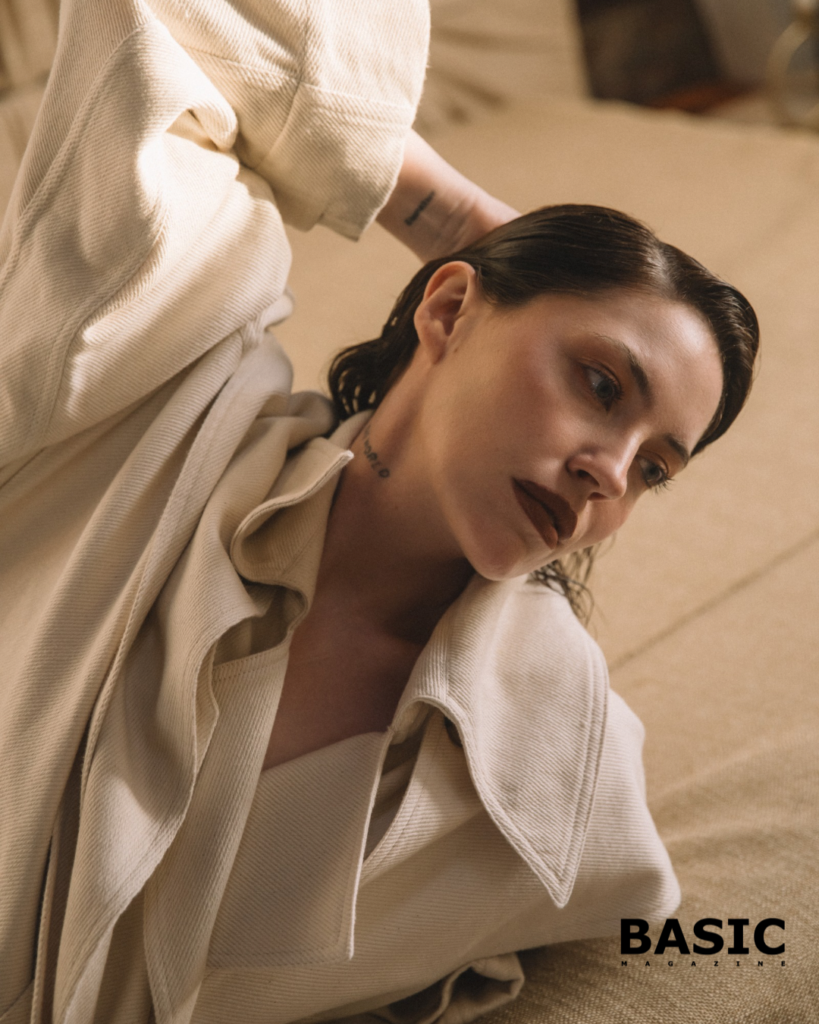
@theo.official
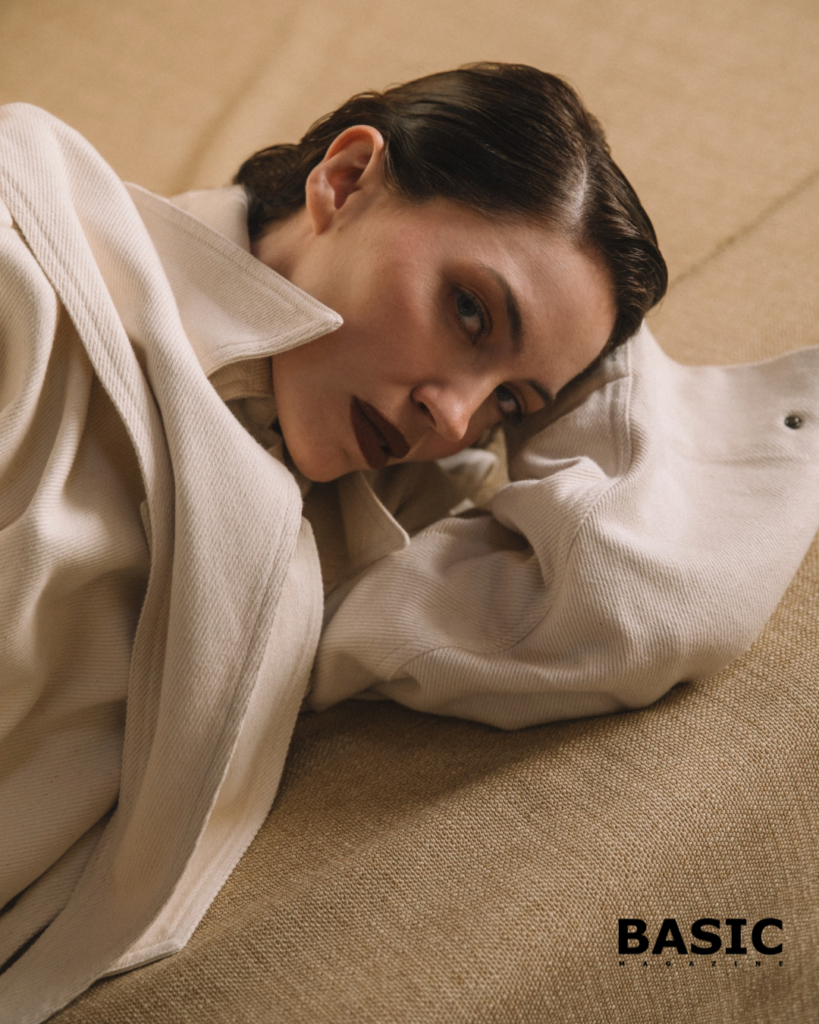
How did your upbringing in Tokyo and Hong Kong influence your passion for singing, and how did karaoke play a role in finding your voice as an artist?
It was the biggest and most influential thing in my life. I would go to the karaoke bars after school. It was something to do in Japan, and I would see my dad singing Frank Sinatra. There was this light in his eyes and I just found myself wanting to chase the feeling he seemed to capture. Then, when I was in Hong Kong, I really learned about heartbreak and had the very typical high school experiences that lend so well to writing and the need to express myself. I really feel like the combination of both of those things had a huge impact.
“River” has been an incredibly successful track for you. What emotions or experiences inspired the creation of this breakout hit, and how has its resonance with listeners impacted your career?
At the time, I was in my first long-term relationship and even while being in a relationship, I felt extremely lonely. I think there is something so painful about being in a relationship with someone and feeling lonely, rather than feeling lonely when single or on my own. When I went to the studio, I wanted to describe the metaphors associated with that feeling. As a water sign, I deeply connect with water and experience all emotions intensely. I wanted to write about a state of longing, as can be heard in songs like “Wild Horses” and “River.” I was also longing for music, and for my music to be heard. I had been performing every single night for years. I was writing about two different relationships and two different kinds of love.
How do you handle feelings of vulnerability and self-doubt as a public figure? Can you share a moment when you felt most vulnerable and how it may have manifested in your work?
From a young age, I always knew that pursuing music would require sacrificing privacy. This was something I understood, especially considering the destructive portrayal of women in the media during the early 2000s. It taught me that this was the side of music that could be very difficult. With that, I’ve always had some protection around myself. Then, when my sister got sick, it reached a point where doctors told us they had nothing more they could do. So, with her condition, I turned to online platforms for the first time and asked for help. I wanted to know if anyone had any way to help us with this particular type of cancer, and there was such an outpour of support. I think that was the first time I was my most vulnerable self, and then, my sister passed away. That led to the song “High Water,” which is about how I was feeling during the whole experience, both consciously and subconsciously. I think that is how my vulnerability really made its way into music. The biggest misconception about the online space is that it is cold, empty, and robotic, but there is a community that can be tapped into where people really just want to be good and help each other. I like to hope that’s the origin of these platforms. Obviously, social media has become very commercialized and filled with advertising, but in that moment, I saw the purest form of what social media can be.
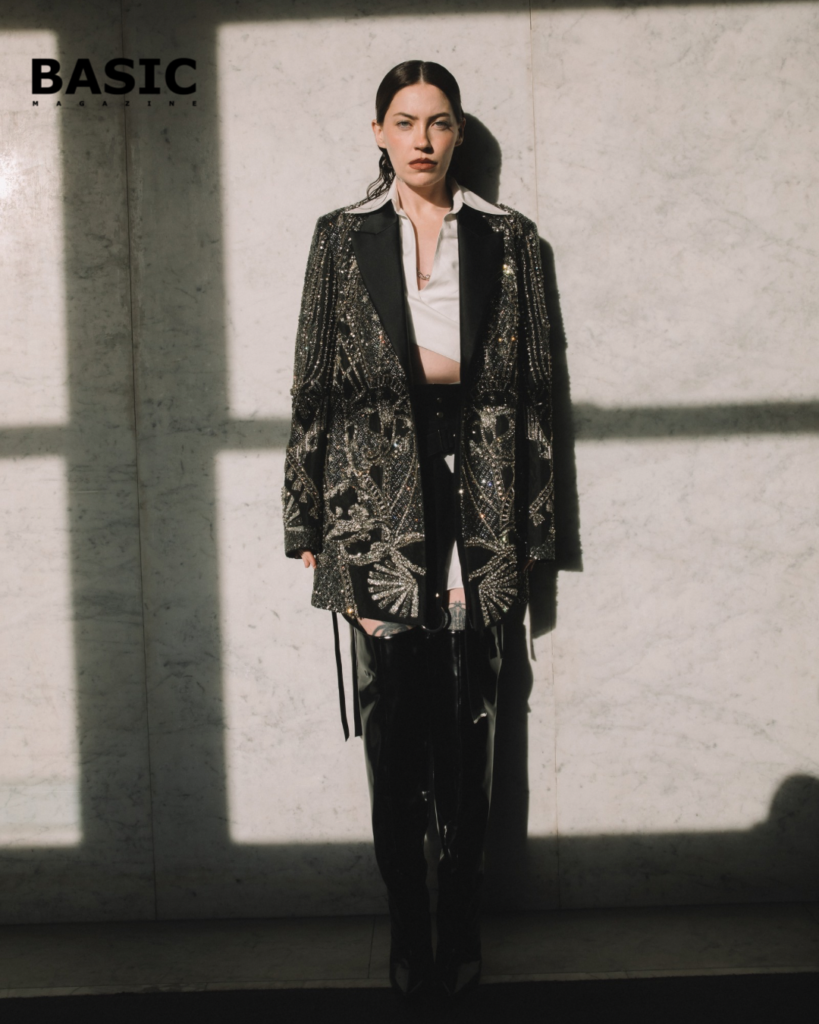
@falgunishanepeacock.nyc
White Crop Top, White Skirt
STOLEN STORES @stolen.stores
Black Skirt ASHTON MICHAEL @ashtonmichael
Boots KWK BY KAYKWOK
@kwkbykaykwok
Necklace JULIEN RIAD SAHYOUN
@julienriadsahyoun
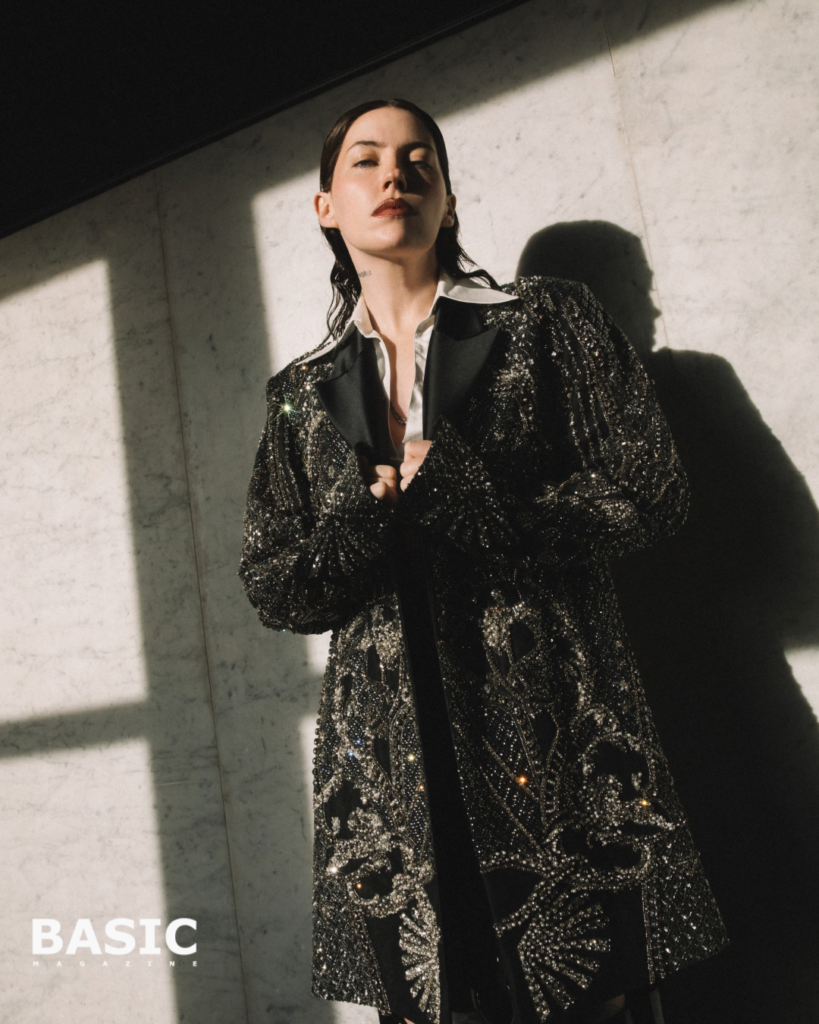
“I just want to share that there is power in your softness. There is power in your female rage. There is power in all of it. The juxtaposition of the complexity of being a human, being a mom, and being a woman is what it’s really all about.”
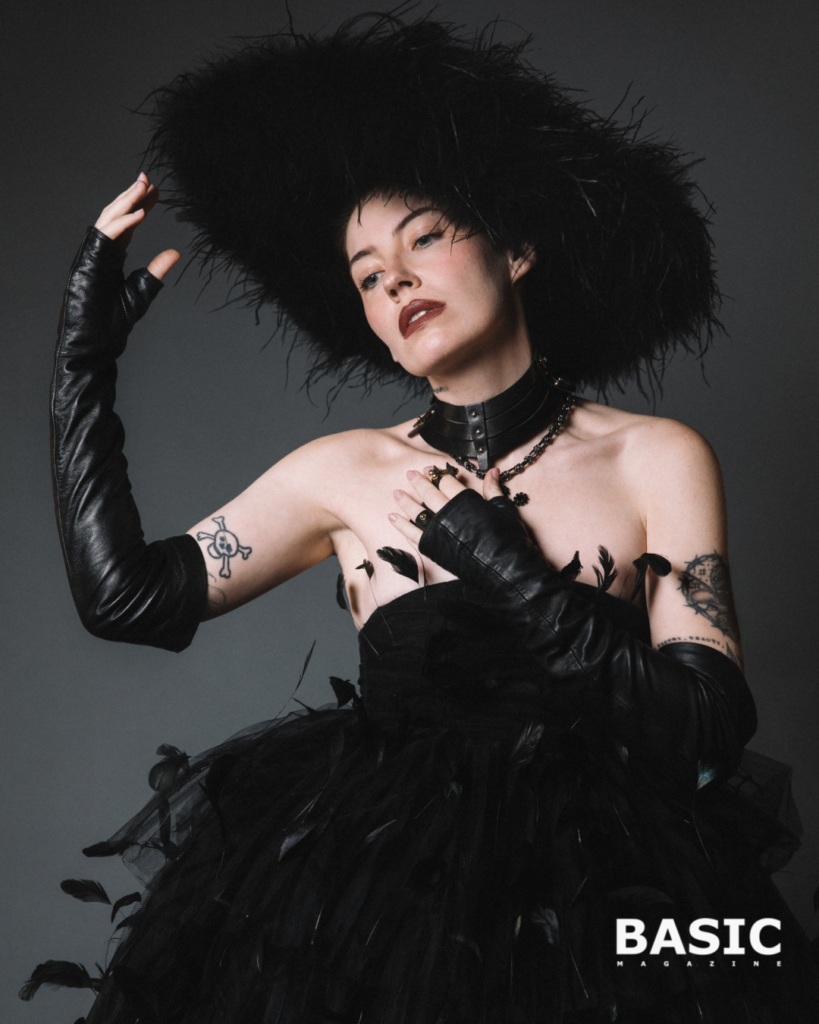
Gown CHARAH @charah.studio
Gloves UNCUFFED LEATHER @uncuffedleather
Rings, Choker LIBRA BY EMILIA SIANO @emiliasiano_jewelry
Necklace TOVA @tovastore
You faced significant challenges during a hiatus from music, including the tragic loss of your sister and becoming pregnant. How did these life events shape your perspective on the cyclical nature of life and death?
My first thoughts about going on the journey of pregnancy was actually while sitting with my sister in the hospital room. I realized that nothing else mattered except for our familial bond. I do want to say, that this was my particular experience with my sister, but your family doesn’t have to be blood related. In that moment though, that’s how I felt. After she passed away, the dream of ever becoming a mom really left because I saw us raising our kids together. I saw both of our personalities serving different purposes for our kids and having that dynamic where my kids could go to her for certain things and her kids come to me for others. When she passed away, that dream disappeared. It was the only traditional dream that I had in my back pocket. It wasn’t until I worked on my mental health that I was able to really venture into that journey. I didn’t know what fertility would bring. My sister passed away on January 19, 2022, and my son was born in August of 2022. There was a significant amount of time in between, but it really wasn’t until I allowed myself to dream again that I could even move into that headspace. I cannot express how grateful I am to be my baby’s mom because I didn’t know if I could love again in the way that I loved my sister. It is a different kind of love from what I feel for my husband or friends. It’s a whole other level of love that is so sweet. It feels like such a generous gift from life to have that with my son. That juxtaposition of what you’re describing, when someone passes and a new baby enters the world, is something I find heartbreakingly beautiful. I wish the death part didn’t have to happen, but I am grateful there is something that helps the person continue living.
Having a younger sister as my best friend, I genuinely understand the unique bond and love you are talking about. My heart truly breaks for the difficult loss you have experienced.
Awe, thank you so much.
In what ways do you believe that our capacity for love is intertwined with our nature as human beings, based on your own experiences and observations?
I think the most confusing and disturbing part of the lockdown was having the disconnect from humans and loved ones. It was a time when we noticed who was most important to us and who we were making an effort for. I read that the people who are living the longest are the ones who are part of a community with different generations of individuals you can talk to, rely on, or ask for support from.
Your transition into rock/emo-esque music was inspired by your shared love for the genre with your sister. How does this musical shift reflect the bond you shared with her, and how has it shaped your artistic identity today?
From a young age, it definitely affected the way I performed. You can imagine someone who is watching Paramore or Panic! at the Disco every single day, 24 hours a day. That definitely affects the way you perform and act on stage. I was inspired by that and as an adult, I noticed there was an undeniable honesty within the lyrics. There was also a bit of humor and tongue-in-cheek energy, but I liked the lightness and directness with which those artists seemed to be navigating their emotions. I’ve always been drawn to that.
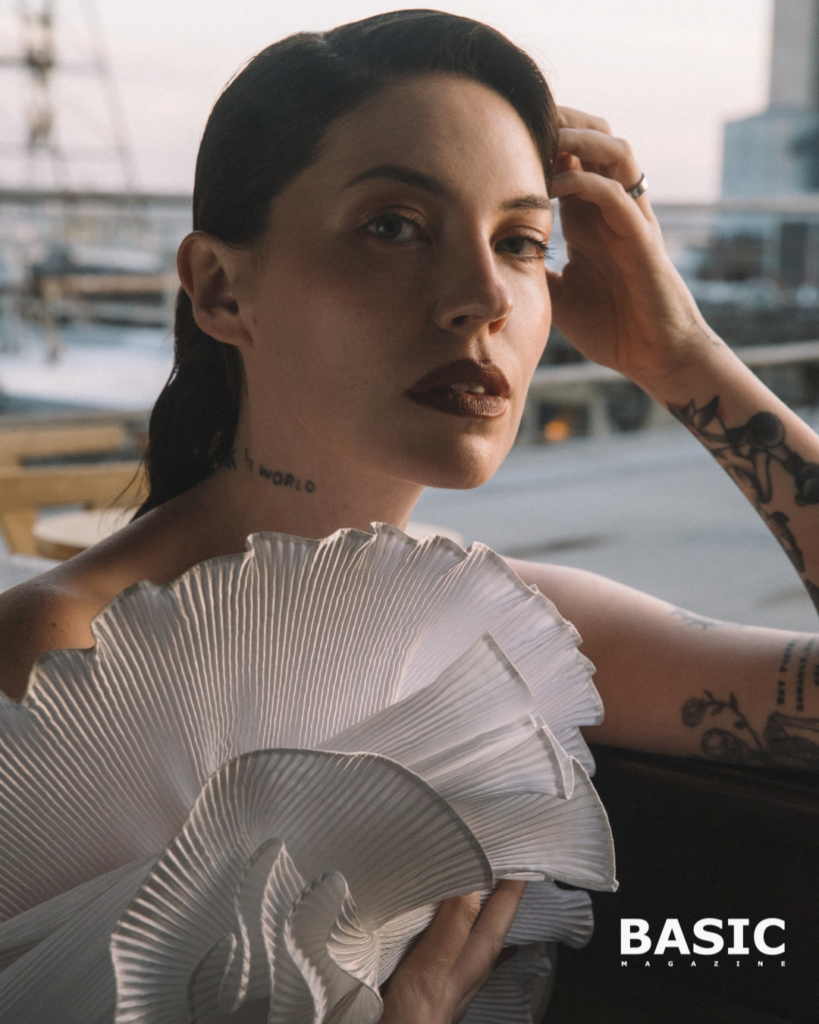
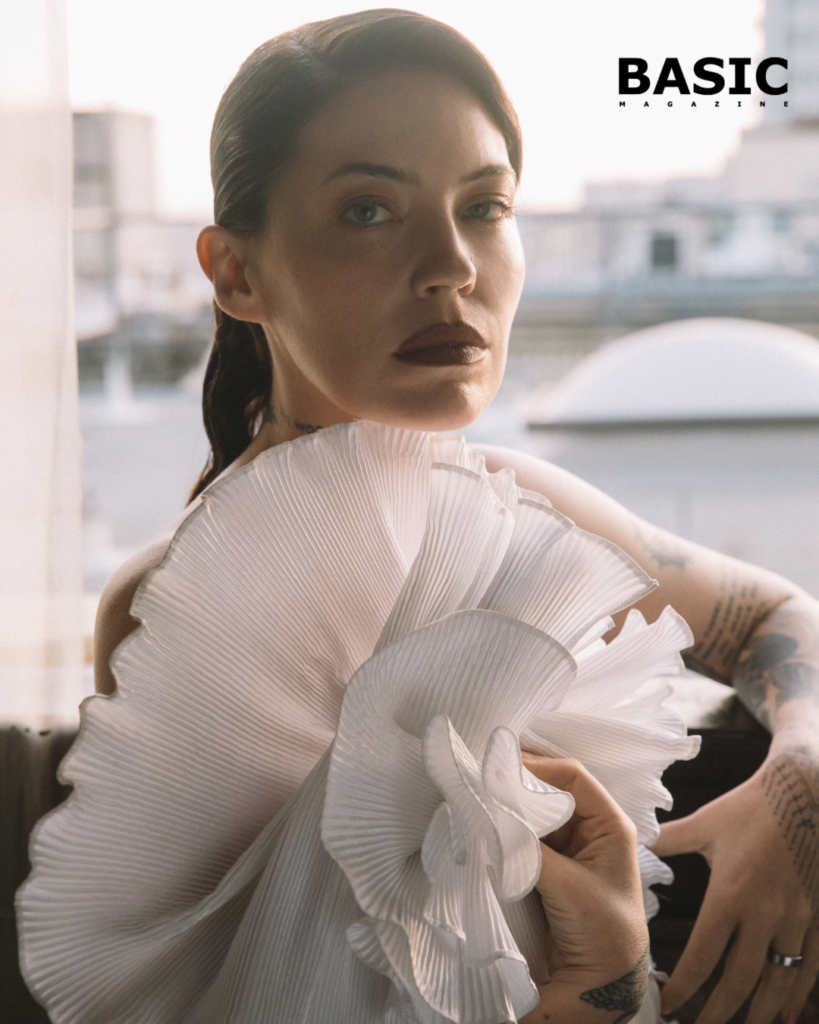
In your creative process as a songwriter, how important is intuition for catching those fleeting moments of inspiration that can slip away quickly if not seized in time?
Intuition is everything. I think that feeling you’re describing is the closest thing I have to a spiritual experience. It feels like you’re a vessel for whatever you are supposed to write down in that moment. It truly is like lightning in a bottle. You have to catch it and write it down. Back in the day, I had a teacher tell me that you must always be thankful for those moments. It doesn’t matter if the idea strikes when you’re driving and can’t pull over and you’re frustrated. You have to be thankful the ideas are still coming, even if it’s at an inconvenient time. I always try to remember this at 3 a.m. when I’m tucked in bed. I remind myself to be grateful for the ideas.
How do you balance your roles as a musician and a mother to your two-year-old while continuing to build your career?
I think balance is a myth, especially when it comes to finding balance between motherhood and work. I think the idea of balance is designed to make us feel bad. The lack of balance is what’s beautiful. There is a way to lean into it. Every person’s job is different, and I am very fortunate to have a creative job that allows me to work flexible hours. I don’t know that balance exists, but if I have a day that feels out of balance, I try to focus on the moments that are bringing me the most joy. I try to remember that everything I am doing are things that I love, and being able to express myself through music makes me a better mom and a better human. Being a mom will always be number one, but I am a little biased. I know that most moms don’t have the same opportunities. I’m very aware of this and advocate for changes to support working mothers.
As a prominent female artist, how do you feel about the representation and recognition of women in the music industry, and what do you hope to contribute to that narrative with your music, specifically with the new track “Woman is King?”
I just loved that at this year’s Grammys, there were so many empowered women being nominated, owning their power, and owning who they are. I also loved that all of them had their differences and there wasn’t some cookie-cutter mold. They all had unique brands and unique audiences. Just seeing the top 10 representing so many women brings me so much joy. When I first started, I was always the only girl on the festival lineup. That is so crazy to think about and not the reality today, of course. There is still so much work to do and so many predators who exist in the industry, but I am really grateful we are seeing so many empowered women on the main stage. As for my song, I just want to share that there is power in your softness. There is power in your female rage. There is power in all of it. The juxtaposition of the complexity of being a human, being a mom, and being a woman is what it’s really all about.
What is a misconception about you as an artist that you would like to set straight, and why is it important for your fans to understand this about you?
This is a great one. Based off what I’ve been told, I would say the biggest misconception about me is that I am very dark and heavy because of my music. A lot of people who meet me are often surprised that I’m not that way. I really try to radiate joy and light. Part of living in my sister’s honor is having such a love for other people. I am someone who loves connecting with others. I love to laugh and I love to talk. The most common thing people say to me is that they are surprised I’m like this considering how dark my music is, but I really believe the reason I can be this way is because I let all the darkness go into my music.
Oh, I hear this often. People frequently say my writing is dark and that I seem unapproachable, but once they get to know me, they see a much different side. It’s truly beautiful to channel your darkness and emotions into creativity, rather than keeping them inside to fester.
Yes, exactly! But also, just as we were talking about earlier, I think we are understanding that women can be multidimensional and crazily, that is relatively knew for our society to comprehend as a whole.
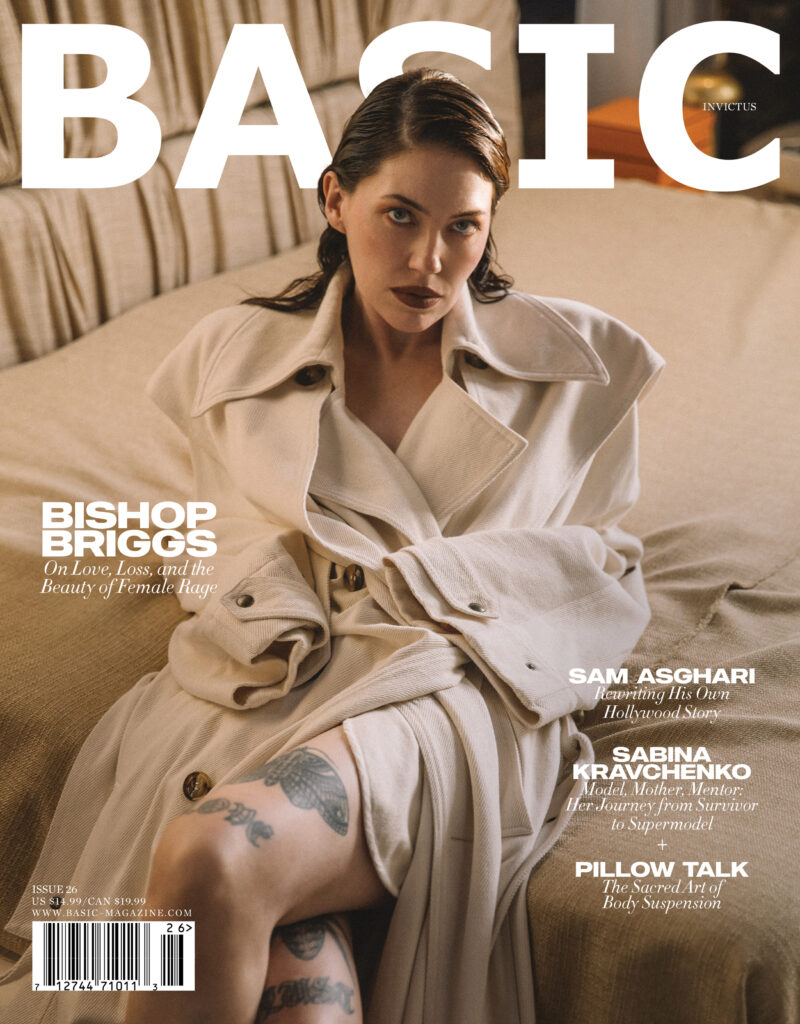
BUY ISSUE 26
You may also like
-
Staying Loud, Staying True: Spacey Jane’s Evolution from Perth to the World
-
Reframing Narratives with KATHERINE FLYNN
-
FIGHT TO THE OTHER SIDE: Hilary Roberts on Suffering, Freedom, and Sharing her Mafia Gifts
-
SEXY 4EVER – An Interview with INJI
-
BREAKING BREAD with GAVIN ROSSDALE: A Conversation about Music, Food, and the Art of Hospitality
-
UNCOVERED: The Liberation of MODEL ROZ
